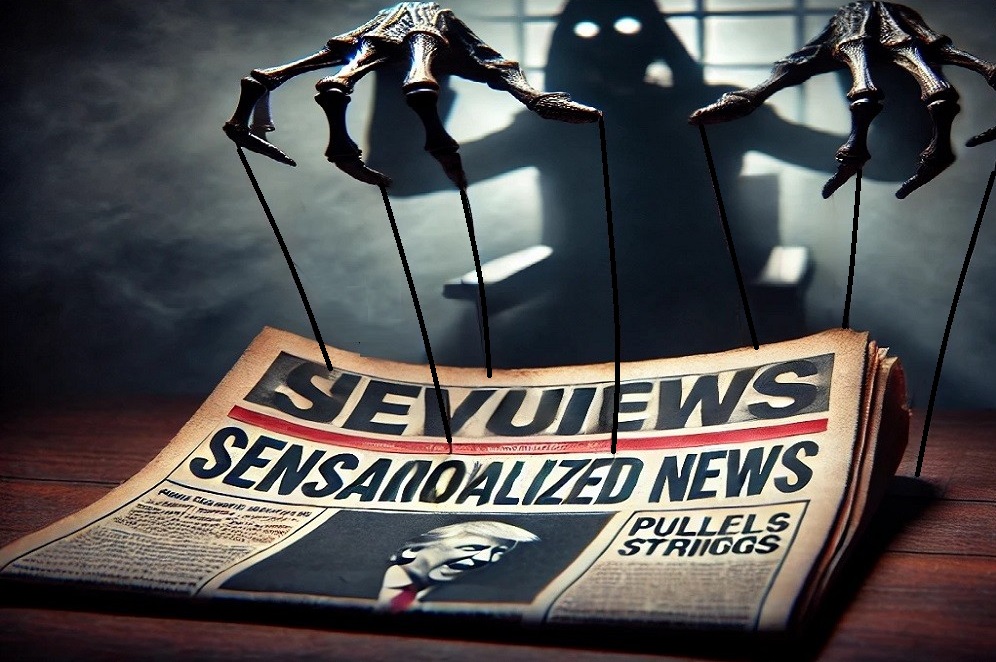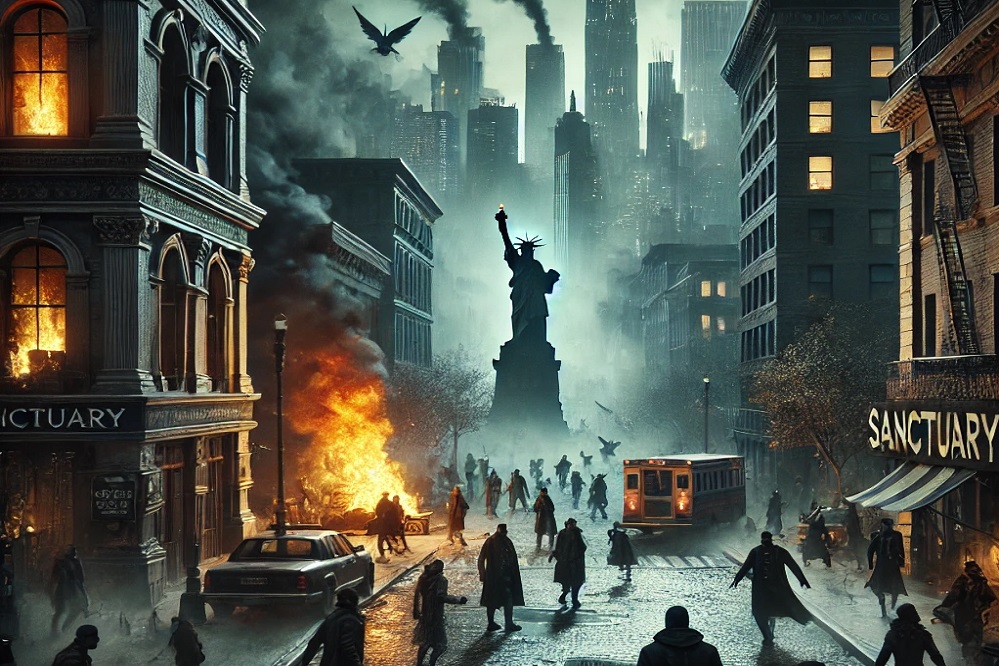In a world of unprecedented access to information, journalism should thrive as a beacon of truth—uncovering facts, presenting balanced narratives, and conducting rigorous investigations. Instead, the media landscape is dominated by selective narratives, biased reporting, and a disturbing erosion of journalistic integrity.
This decay is no accident. Powerful corporate and political interests have co-opted American media, stifling the independence of journalists and reducing news to a manipulative tool for shaping public opinion. Media conglomerates, motivated by profits and political alliances, have turned newsrooms into echo chambers, leaving citizens unable to distinguish fact from propaganda. The result is a media machine that silences dissent, undermines democracy, and places partisan agendas over the public’s right to the truth.
Journalistic integrity is the cornerstone of a democratic society, and without it, the foundation of democracy crumbles. This article explores the ownership of the mainstream media, how Democrats facilitated its consolidation, and why dismantling this monopolistic control is critical. We will also propose actionable solutions the Trump administration can implement to restore democracy, protect free speech, and ensure that journalism serves the people, not corporations or political elites.
Who Owns the Mainstream Media?
The U.S. media is controlled by six powerful corporations that collectively dominate 90% of the news consumed by Americans. This concentration of ownership limits diversity of thought and makes it easier for a handful of elite decision-makers to control narratives on critical political, social, and economic issues.
The Big Six
- Comcast: The largest media conglomerate in the U.S., Comcast owns NBCUniversal, MSNBC, and Universal Pictures. With CEO Brian L. Roberts and his family wielding significant influence, the company has become a major force in shaping public opinion.
- The Walt Disney Company: Disney controls ABC, ESPN, and major entertainment brands like Marvel and Lucasfilm. Its vast reach allows it to influence both news coverage and entertainment content, often blending progressive social messaging into its programming.
- AT&T (WarnerMedia): Through its subsidiaries, AT&T controls CNN, HBO, and Warner Bros. This conglomerate has repeatedly faced criticism for promoting partisan narratives over objective reporting.
- ViacomCBS: Led by Shari Redstone, ViacomCBS controls CBS, Showtime, and Paramount Pictures. The company’s dominance extends into entertainment and news, giving it unparalleled influence over public perceptions.
- News Corp (Fox Corporation): Overseen by Rupert Murdoch, News Corp owns Fox News, The Wall Street Journal, and The New York Post. It is a major driver of conservative narratives, often creating a counterbalance to left-leaning outlets.
- Sony: Although Japanese-owned, Sony Pictures wields significant influence in Hollywood and entertainment globally, shaping international narratives with content tailored to align with elite agendas.
The dominance of these corporations homogenizes narratives, leaving the public with a narrow spectrum of viewpoints that fail to reflect the diversity of America’s population.
Case Studies: The Danger of Controlled Narratives
Media consolidation leads to biased narratives that manipulate public opinion and undermine democratic processes. Here are some stark examples:
1. The Trump-Harris Election Narrative
During the 2024 election, mainstream media perpetuated the false claim that the race between Donald Trump and Kamala Harris was “neck and neck.” Despite Trump maintaining a clear lead throughout, this narrative sought to manipulate voter perception, suppress Republican turnout, and provide cover for potential irregularities.
The media amplified accusations from the Harris campaign while downplaying Trump’s successes, creating an illusion of parity between the candidates. By portraying the election as competitive, media outlets aimed to energize the Democratic base while discouraging Republican confidence. This deliberate manipulation of public perception not only eroded trust in journalism but also raised serious questions about the media’s role in influencing electoral outcomes.
2. The Pro-Israel Stance
U.S. media often adopts an unwavering pro-Israel narrative, portraying Hamas as the sole aggressor in the Israeli-Palestinian conflict. Coverage routinely downplays or ignores the humanitarian crisis in Gaza, presenting a one-sided view that aligns with political and corporate interests. This bias undermines the credibility of journalism and limits public understanding of complex international issues.
By omitting key details, such as the historical context of the conflict or the impact of Israeli policies on Palestinian civilians, the media prevents meaningful public discourse. This selective reporting reflects the priorities of media owners, who often have financial and political connections to pro-Israel lobbying groups.
3. The Russia-Ukraine War
The mainstream media’s coverage of the Russia-Ukraine conflict highlights the dangers of controlled narratives. While Russia’s actions in Ukraine have been widely condemned, legitimate questions about Ukraine’s government, its treatment of certain populations, and its ties to foreign powers are often ignored or dismissed.
Western powers’ roles, such as NATO expansion and military aid to Ukraine, are rarely scrutinized. This selective reporting aligns with globalist agendas, presenting a sanitized version of the conflict that skews public perception and limits informed debate.
4. Social Media Manipulation
Social media platforms like Facebook (Meta), TikTok, and Twitter amplify dominant political narratives through algorithmic bias, censor dissenting views, and manipulate public discourse. These platforms shape election outcomes by suppressing conservative voices and promoting content aligned with their ideological leanings. The lack of transparency in their moderation policies further erodes trust in online platforms.
Solutions: Dismantling Media Monopolies
To restore democracy and journalistic integrity, the Trump administration must implement these reforms:
1. Enforce Media Ownership Limits
- One Company, One Voice: Restrict each entity to owning one outlet per medium—one TV station, one newspaper, one website, and one radio station. This decentralization ensures no single corporation dominates public discourse.
- Cap Market Share: Limit the percentage of national or local audiences that any corporation can control, preventing monopolistic behavior.
- Reinstate Cross-Ownership Bans: Prohibit owning multiple outlets in the same market to encourage competition and diversity.
2. Strengthen Antitrust Enforcement
- Use existing laws like the Sherman Act to break up conglomerates that dominate media ownership.
- Penalize corporations for using shell entities or subsidiaries to bypass ownership restrictions.
3. Reform the Telecommunications Act
- Reverse the deregulations of 1996 that allowed unchecked media consolidation.
- Incentivize independent and local journalism through grants and tax credits, empowering smaller outlets to thrive.
4. Regulate Social Media
- Platform Neutrality: Require platforms to maintain political neutrality in their algorithms.
- Transparency Mandates: Force companies to disclose moderation practices and prevent covert censorship.
- Free Speech Protections: Prohibit arbitrary bans on content, ensuring platforms serve as open forums for public discourse.
5. Establish Independent Oversight
- Create a Federal Media Oversight Commission to monitor compliance with ownership laws, investigate violations, and impose penalties.
- Mandate regular audits of media companies to ensure transparency and accountability.
6. Revitalize Public Journalism
- Establish a publicly funded institution to support investigative journalism free from corporate influence.
- Promote media literacy programs to educate citizens on identifying bias and evaluating news sources critically.
Conclusion: Journalism and Democracy at a Crossroads
The fight to dismantle mainstream media monopolies is not just about restoring journalistic integrity—it is about safeguarding democracy itself. When a handful of corporations control the flow of information, the public is left vulnerable to manipulation, misinformation, and ideological indoctrination.
By breaking up monopolies, regulating social media, and revitalizing independent journalism, the Trump administration can restore balance, transparency, and accountability to the media landscape. These reforms will empower citizens to make informed decisions, hold leaders accountable, and protect the democratic values that define America.
The stakes have never been higher. This is not just about fixing journalism—it is about preserving the very essence of democracy. If decisive action is taken, America can reclaim its role as a beacon of freedom and truth, setting a global example for a free and independent press.



